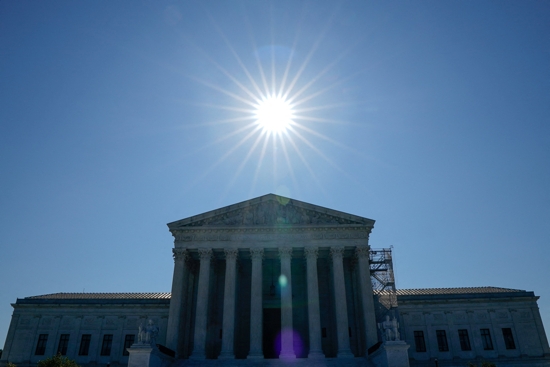
The U.S. Supreme Court heard oral arguments May 15 over the Trump administration’s executive order to end birthright citizenship for children born in the U.S. to parents without legal status or temporary visa holders, and whether federal judges could properly block that order.
Although the three combined cases heard by the high court stem from an executive order Trump signed within hours of returning to the Oval Office in January seeking to end the practice of birthright citizenship for these children, arguments often centered on the Trump administration’s contention that federal judges improperly blocked the order despite arguments it unlawfully violated the 14th Amendment.
Although some of the justices from the court’s perceived conservative ideological wing appeared concerned about nationwide injunctions issued by lower court judges, the justices more broadly appeared skeptical of Trump’s ability to effectively rewrite the long-standing legal interpretation of birthright citizenship by executive order.
“It’s a pure legal question: What does the Constitution mean with respect to citizenship?” Justice Sonia Sotomayor, part of the court’s perceived liberal wing, asked at one point. She drew an analogy to Trump’s order to a hypothetical president seeking to reinterpret the Second Amendment to “take guns away from every citizen.”
The 14th Amendment states, “All persons born or naturalized in the United States, and subject to the jurisdiction thereof, are citizens of the United States and of the State wherein they reside.”
Despite arguments from Trump that the U.S. is “the only country in the world that does this,” the United States is one of at least 30 countries, including Canada and Mexico, in which the principle of “jus soli” or “right of soil” applies. This legal principle grants citizenship at birth without restrictions, regardless of the citizenship status of the parents. Most of those countries are located in the Americas, and scholars trace the origins of the practice to colonial times.
Trump’s order, part of an effort to implement his hardline immigration policies, directed federal agencies to stop issuing passports, citizenship certificates and other official documents to children born in the U.S. to parents without legal status or temporary visa holders. The order would not apply retroactively, Trump said, and would be enforced in 30 days.
Federal judges in the states of Maryland, Massachusetts and Washington subsequently blocked Trump’s directive nationwide, arguing it was in apparent violation of the 14th Amendment.
Trump’s order on birthright citizenship was among the executive orders on migration issues criticized by Bishop Mark J. Seitz of El Paso, Texas, chair of the U.S. Conference of Catholic Bishops’ Committee on Migration. In a Jan. 22 statement, he said that “the proposed interpretation of the Fourteenth Amendment to limit birthright citizenship sets a dangerous precedent, contradicting the Supreme Court’s longstanding interpretation.”
During oral argument, Justice Brett Kavanaugh questioned U.S. Solicitor General D. John Sauer about whether the federal government was actually prepared for the practical implications of enforcing Trump’s order.
“What do hospitals do with a newborn? What do states do with a newborn?” Kavanaugh asked. Sauer downplayed state-level changes, but said the federal government may reject documentation with “the wrong designation of citizenship.”
Kavanaugh pressed for more specific answers, pointing to the executive order’s 30-day window to develop a policy.
“You think they can get it together in time?” he asked. Sauer suggested officials would “figure it out.”
Kelsi Corkran, a lawyer with the Georgetown University Law Center’s Institute for Constitutional Advocacy and Protection and lead counsel for some of the plaintiffs challenging the order, pointed to a significant number of judges finding the order “blatantly unlawful.”
Justice Elena Kagan made a similar point, suggesting the government was trying to avoid a ruling directly on the constitutionality of Trump’s order.
“You just keep on losing in the lower courts,” she told Sauer. “What’s supposed to happen to prevent that?”
“Every court has ruled against you,” she added. Sauer replied, “We’ve only had snap judgments on the merits.”
Justice Amy Coney Barrett also pressed Sauer on why the Trump administration did not ask the Supreme Court to directly decide whether Trump’s order was constitutional.
“If we offer the merit first, that’s a vehicle problem, because the court has, in many cases, just addressed the merits and not the remedial issue,” Sauer said in reference to the administration’s argument about lower court judges.
J. Kevin Appleby, senior fellow for policy at the New York-based Center for Migration Studies and the former director of migration policy for the USCCB, told OSV News that “birthright citizenship has been enshrined in our Constitution for well over half of U.S. history and has served our nation well.”
“To repeal it now would create a large undocumented and stateless population in our country, a permanent underclass of persons without the rights we all enjoy,” he said. “Children would become the victims of this policy and would suffer from it the rest of their lives.”
A decision in the case is expected before the end of the court’s term, which typically ends in June.
Kate Scanlon is a national reporter for OSV News covering Washington.




